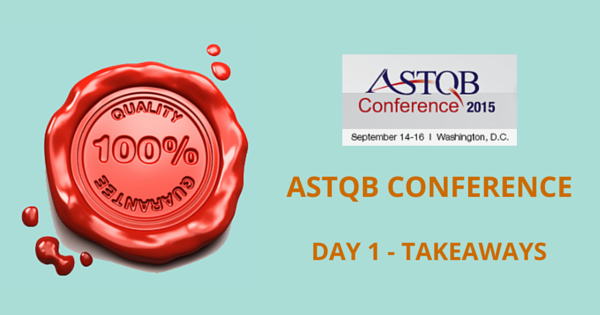American Software Testing Qualifications Board (ASTQB) mission is to promote professionalism in software testing in the US. ASTQB takes care of this by administering quality exams for the ISTQB, facilitating training providers in delivering high quality courses, engaging in the ISTQB working groups, and much more in developing the software testing profession.
ASTQB Conference 2015, held in Washington DC this year (Sep 15-16) is a results focused conference that’s designed to give practical , ready-to-use strategies on software testing, QA, security, application development and IT management.
Hear Gary McGraw, CTO of Cigital, Inc., on “Scaling a Software Security Initiative” http://t.co/XwN1Q6gLmD pic.twitter.com/xk6MJIh3ZD
— ASTQB (@astqb) May 20, 2015
The Conference started with a keynote presentation from the well known speaker in the testing world Gary Mcgraw, CTO, Cigital Inc. His strategic advice counsels business executives and top management, technology developers, IT and operations staff in industries such as finance, software and energy about the lessons from the security tool BSIMM (Building Security In Maturity Model).
The BSIMM is a study of real-world software security initiatives organized to determine where we stand with software security initiatives and how to evolve our efforts over time. Not to forget Dr.McGraw’s book on ‘Software Security – Building Security In’ is a best selling book on software security.
The next breakout session was on “Turning Agile around in the waterfall canal” by Mike Prisby
Listening to Mike Prisby @astqb conference, explaining how @ups transitioned to #agile development.
— rbcs (@RBCS) September 15, 2015
The key learning objectives include
- Transition from waterfall test preparation processes to Agile.
- Transition from waterfall test execution processes to Agile.
- Identify and mitigate key transitional pitfalls.
- Managing expectations through reporting.
Another interesting breakout session presented by Suresh Chandra Ganesh Bose & Anagha Mahajan was on “How to Take Organizations to Higher Testing Maturity”. This was for organizations that are looking for improvements in their quality process. The answer is to implement the TMMI (Test Maturity Model integration).
Test Maturity Model integration (TMMi) is a detailed model for test process assessment and improvement. TMMi staged model contains stages or levels that determines the maturity of an organization and lays down road map for moving from one maturity level to next. As the processes evolve, an organization passes from adhoc (L1) to optimized levels (L5). Application of TMMi will lead organizations to an advanced mature test process, reduced rework, increase in defect removal efficiency, higher productivity and faster time to market.
The breakout session on “Clinical Software Quality Assurance Drives Continuous Improvement” by Nina (Punita) Watson covered an important category of software testing: Compliance and conformance to standards in clinical software testing. Unlike other software testing clinical software defects usually has high impact which includes the patient’s life.
A defect in a software application that manages patient’s care can cause life threatening circumstances. The session covered risk management, quality governance and continuous improvement is driven by “Clinical Software Quality Assurance.”
The final keynote session was by Caper Jones, the 2014 International Software Testing Excellence Award Winner on the Topic State of Software Quality 2015.
Capers and his colleagues have collected historical data from thousands of projects, hundreds of corporations, and more than 30 government organizations. This historical data is a key resource for judging the effectiveness of software process improvement methods and also for calibrating software estimation accuracy.
The sessions were very informative and can be put to use by both large and small organizations. The session on clinical software testing highlighted how important testing is and how it saves lives. We felt proud to be a part of the testing community.
Eagerly waiting for Day 2’s sessions- will follow-up with a blog too.




